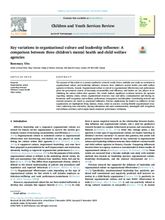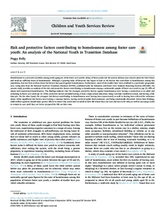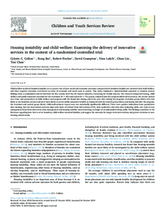This page contains documents and other resources related to children's care in the Americas. Browse resources by region, country, or category.
Displaying 1181 - 1190 of 3191
A number of psychological factors have been found to be relevant in terms of problematic use of digital devices. Some of them may serve as risk factors, while others mean protection. The main goal of present study was to determine user profiles and to examine differences among them based on several psychological variables using cluster analysis.
For this study, a sample of youth in foster care was used to provide a new examination of the relation between child maltreatment exposure and internalizing symptoms, to test the possible moderating effects of both appraisals and spirituality, and examine differences between children and adolescents.
The current study begins to address a gap in the literature by examining the association of income instability and child maltreatment in a sample of low-income families deflected from Child Protective Services.
The purpose of this article is to present qualitative research results from a multiple case study on variations in organizational culture and leadership influence between three children’s mental health and child welfare agencies in Ontario, Canada.
This study examined family- and state child welfare system predictors of successful reunification in the United States, or reunification with no reentries into foster care.
Using data from the U.S. National Youth in Transition Database (NYTD), combined with the Adoption and Foster Care Analysis Reporting System (AFCARS), the present study provides an analysis of the risk and protective factors contributing to homelessness among a nationwide sample of foster care youth at age 21, 29% of whom had experienced homelessness.
The objective of this study was to examine the utility of child protective services data in identifying predictors of placement disruption.
In this opinion piece for the Chronicle of Social Change, Theresa Covington, the director of the Within Our Reach office at the Alliance for Strong Families and Communities and the director of the National Center for Fatality Review and Prevention, describes the need for better data sharing to prevent child maltreatment fatalities in the United States.
This research examined the impact of individual and relational characteristics of foster parents on permanency outcomes for children in care.
This study employed a mixed-methods approach to examine process findings from a randomized control trial from the first county-level Pay for Success initiative, Partnering for Family Success.






